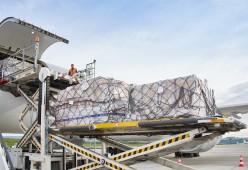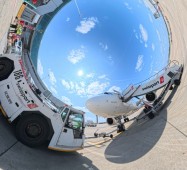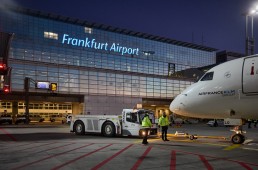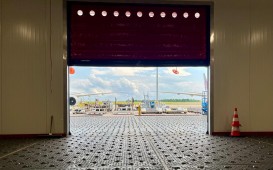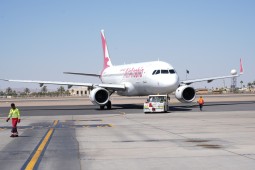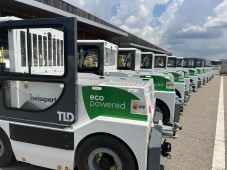Swissport accelerates shift to electric vehicles
Starting from January 2025, Swissport will mandate the purchase of electric-powered variants for many vehicle categories. This move further speeds up the transition of its fleet of Ground Support Equipment (GSE) from diesel and gasoline-powered vehicles to electric units.
Swissport International, the global leader in aviation ground services, present at almost 300 airports across the globe, is increasing its investments in electric Ground Support Equipment (eGSE). As part of its commitment to achieving 55% eGSE by 2032, Swissport is implementing a newly adopted procurement policy that stipulates starting January 2025, new vehicles across numerous categories can only be ordered in electric versions. This includes vehicles for baggage transport, conveyor belts for loading luggage onto aircraft, mobile staircases for passenger boarding, light & medium forklifts, and service vehicles for waste disposal and fresh water supply. By 2027, Swissport intends to procure only electric GSE, depending on the availability of the required equipment and the development of sufficient charging infrastructure at airports. This policy is a key step in translating Swissport’s ESG commitment into tangible action and advancing our goal to significantly reduce our carbon footprint.
“Swissport reaffirms its goal to continuously increase the proportion of electric, zero emission ground support equipment,” says Warwick Brady, President & CEO of Swissport International. “Over the next ten years, we will invest over a billion euros into a new electric fleet. Our strong commitment to sustainability and clean energy also supports airlines' ESG goals and reduces their supply chain emissions.”
SWISSPORT OPERATES LARGEST GSE FLEET GLOBALLY
Swissport is the largest global operator of airport ground support equipment with a fleet of approximately 14,300 motorized units. The electrification of its fleet offers numerous benefits to airlines, airports, and employees, including more reliable and comfortable equipment, noise reduction, health and safety features such as anti-collision systems, increased asset availability, and enhanced automation potential.
“To support our electrification roadmap, airports must prioritize installing charging infrastructure, and ensure their electrical grids can handle increased power demands”, adds Warwick Brady. “Swissport also urges regulators and IATA to establish standardized charging connectors and protocols and to require airports to provide a minimum number of electrifiable GSE parking spaces.”
Despite charging infrastructure constraints, Swissport is making significant strides in electrifying its fleet especially at major European hubs: At Zurich Airport (ZRH), Swissport currently operates with 44% electric GSE and is set to reach 55% by the end of 2025. At Amsterdam Airport Schiphol (AMS), Swissport has invested 2.5 million Euros in electric assets and plans to transition its entire motorized GSE fleet to electric soon. As an example, all cars used on the apron at AMS will be electric by December 2024.
For its ground operations at Rome Fiumicino Airport (FCO), Swissport has already deployed five electric buses, with seven additional buses on order. And at Frankfurt Airport, for which Swissport recently secured a license to provide ground services starting February 2025, the company plans to invest approximately 25 million Euros in electric vehicles.
Download PDF
20240913_MediaRelease_SWISSPORT ACCELERATES SHIFT TO ELECTRIC VEHICLES (en)
pdf 95.7 kBContacts
- Stefan Hartung
- [email protected]


